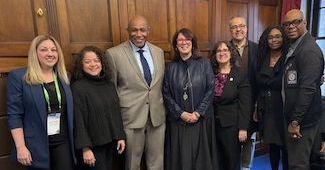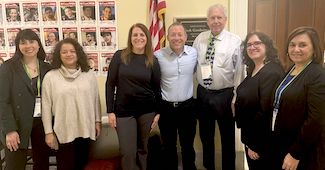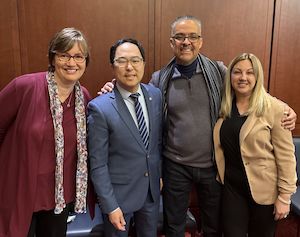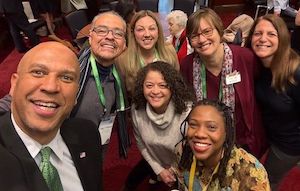Site Search
- resource provided by the Forum Network Knowledgebase.
Search Tip: Search with " " to find exact matches.
Summer always brings to mind those great “summer reads.” This has been an “occasional series” of CNJG eNews during the summer, over the years. In addition to this year’s curated list – I’m thrilled to share recommendations from a few CNJG Board members and the CNJG team!
CNJG Board of Trustees’ Secretary, Maisha Simmons, Robert Wood Johnson Foundation, recommends Heather McGhee’s The Sum of Us: What Racism Costs Everyone and How we can Prosper Together. There’s also a podcast series, and the book has been adapted for young readers.
The Work: My Search for a Life that Matters by Wes Moore is the top pick from Board member, Jasmyne Beckford, The Prudential Foundation. Jasmyne reflects, this book helped her think about how she can live a life that creates impact for generations both personally and professionally.
CNJG Board member Justin Kiczek, F. M. Kirby Foundation, recently read Getting Beyond Better: How Social Entrepreneurship Works. “As our foundation holds both stewardship and entrepreneurship as core values, it helps me understand how social entrepreneurs start their journey and scale their solutions.”
In honor of Black Philanthropy Month this August, I’m excited to feature a few great reads created to inspire and inform your philanthropic journey. Thank you to Manager of Communications Shakirat Odunsi for curating this list:
- Madam C. J. Walker's Gospel of Giving: Black Women's Philanthropy during Jim Crow highlights Walker’s visionary approach to philanthropy and community-building, emphasizing the vital role of Black women’s giving in advancing social justice. Freeman’s work sheds light on how Walker’s philanthropy was an extension of her entrepreneurial spirit and commitment to racial and gender equality.
- Ford Foundation’s Darren Walker reimagines Andrew Carnegie’s vision of philanthropy for the modern era in From Generosity to Justice: A New Gospel of Wealth, urging philanthropists to go beyond charity and address systemic inequalities to foster justice and lasting change.
- Emergent Strategy: Shaping Change, Changing Worlds encourages readers to embrace adaptability and resilience by using emergent strategies – small-scale actions that create large-scale impact. Author adrienne maree brown challenges traditional models of organizing and invites us to envision a more just and equitable world through collaboration, creativity, and deep connections with others. It’s a guidebook for those seeking to shape the future and navigate the complexities of change.
- Isabel Wilkerson explores how entrenched hierarchies based on race and class impact every aspect of our lives in Caste: The Origins of Our Discontents. Through compelling narratives and meticulous research, she reveals how this hidden system continues to perpetuate inequality and injustice, challenging us to confront these deeply rooted structures and work toward true equality.
From the CNJG team, Director of Member Services Craig Weinrich is currently reading How We Give Now: A Philanthropic Guide for the Rest of Us by Lucy Bernholz. This book demonstrates that philanthropy is about much more than money. Bernholz posits that even giving our data willingly to companies is an act of philanthropy. This is a great intersection to the Spring Colloquium conversation around AI, and ongoing discussions about how we can expand our definition of philanthropy as guided by our Strategic Plan.
Chanika Svetvilas, Manager of Programs and Learning recommends Against Technoableism by Ashley Shew and Imagination A Manifesto by Ruha Benjamin. Not too long ago I read Four Thousand Weeks: Time Management for Mortals, which prompted me to really consider what each of us should focus on in our day-to-day work, and what we need to let go. It’s a practical, insightful guide that led to several “aha” moments. All three books challenge us to think very differently about our world and what’s possible.
And finally, a recently discovered read I’ve gifted to family and friends, All the Colors of Life by renowned artist Lisa Aisato; this will lift your spirits as you find yourself paging through it and experiencing it over and over again.

Happy Summer Reading!
On a different note, I hope you will join us at the Summer Joint Policy Forum – Nonprofit and Philanthropic Champions for New Jersey on August 13, at The Heldrich in New Brunswick. I look forward to seeing you there, and hearing what’s on your summer reading list!
Sincerely,
Theresa Jacks, President and CEO
Council of New Jersey Grantmakers
Foundation leaders have a unique opportunity to serve as powerful champions of their missions. Partnering with your grantees can amplify your impact. The following guide is designed to help you start having an honest conversation in the boardroom; a conversation about your foundation’s goals, approach, and, most importantly, vision for the future.
A CNJG corporate member asked for help with the scenario in which a corporate policy of not supporting religious organizations in their grantmaking, causes problems helping during a disaster in an urban or rural area, when the program that is delivering the disaster relief is based within a church. They want to work with those programs (a church serves as the program’s fiscal sponsor) who support efforts for hunger, homelessness, substance abuse recovery, racial equity, etc. as long as they do not discriminate and do no limit it to their own congregations. The request for policy samples to work around this religious organization hurdle as long as there is no discrimination or funding the actual church’s worship, was compelled by CNJG staff and is listed here.
Philanthropic organizations of all shapes and sizes are well positioned to support Communities for a Lifetime (CfaL). This issue brief explores four roles for philanthropy in advancing CfaL work.
New Jersey Organizations and Resources
- American Red Cross – Chapters covering the State of New Jersey
- State of New Jersey Catholic Charities - Diocese of Camden - Diocese of Trenton
- Community Emergency Response Teams provides opportunity for citizen volunteers to be involved in emergency management activities.
- Community Food Bank of New Jersey
- Goodwill NY NJ
- Jersey Cares recruits and engages volunteers in efforts that address community-identified needs.
- NJ 2-1-1 helps people find solutions to personal needs by informing them of resources in their community.
- NJ Department of Human Services: Disasters & Emergencies - Help & Information
- Pass It Along, an affiliate of the Hands on Network, recruits and engages volunteers.
- The Salvation Army - New Jersey Division
- Volunteer Center of Bergen County, Inc.
- Volunteer Lawyer’s for Justice - Provides legal support to New Jersey residents.
- United Way of Greater Philadelphia and Southern New Jersey
Nationwide Organizations and Resources
- American Institute for Conservation—Collections Emergency Response Team (AIC-CERT)
Offers free emergency response assistance to cultural organizations with collections. AIC-CERT is supported and managed by the Foundation of the American Institute for Conservation (FAIC) and consists of a force of 107 “rapid responders” trained to assess damage and initiate salvage of cultural collections after a disaster has occurred. - American Red Cross - Disaster Recovery Guides
- BBB Wise Giving Alliance
The BBB Wise Giving Alliance helps donors make informed giving decisions and advances high standards of conduct among organizations that solicit contributions from the public. - Center for Disaster Philanthropy
The when, where, and how of informed disaster giving - Center for International Disaster Information (CIDI)
Provides individuals, groups, embassies and corporations with information and guidance in support of appropriate international disaster relief efforts. - CERF+ Artists’ Relief Exchange along with its partners in the National Coalition for Arts Preparedness and Emergency Response are committed to providing and connected people to emergency relief.
- FEMA
Information from the Federal Emergency Management Agency - FEMA Geo Portal
This portal provides geospatial data and analytics in support of emergency management - FEMA - National Disaster Recovery Framework
This guide provides a flexible structure that enables disaster recovery managers to operate in a unified and collaborative manner to provide effective recovery support to disaster-impacted jurisdictions. - Guide to Navigating FEMA and SBA Disaster Aid for Cultural Institutions
- The Tsunami Learning Project: Lessons for Grantmakers in Natural Disaster Response
This guide, published by Grantmakers Without Borders, offers new tools for grantmakers when responding to natural disasters. - IRS Disaster Relief Resources for Charities and Contributors
In the aftermath of a disaster or in other emergency hardship situations, individuals, employers and corporations often are interested in providing assistance to victims through a charitable organization. The IRS provides a number of resources to help those involved in providing disaster relief through charities. - Disaster Relief, Providing Assistance Through Charitable Organizations
IRS Publication 3833 describes how members of the public can use charitable organizations to provide assistance to victims of disasters or other emergency hardship situations. - Emergency Drying Procedures for Water Damaged Collections
A guide from the Library of Congress - Preparation & Response for Cultural Institutions
A guide from the National Trust for Historical Preservation. - Small Business Administration
Learn about and apply for SBA Disaster Loans for business of all sizes – private and nonprofit
When considering how to improve health outcomes for low-income individuals, most people think about providing access to good medical care and keeping the cost of that care as low as possible. What people rarely think about is the connection between good health and quality affordable housing.
Adopted by CNJG”s Board of Trustees in October 2023, these eight Principles offer philanthropy a source of direction for their own equity journey. Each principle begins with a common understanding followed by developmental steps, and the aspiration for each principle. These principles are intended to promote continuous learning, vulnerability, and reflection for how philanthropy can evolve from its historical roots to a more trusting, accountable, and equitable model.
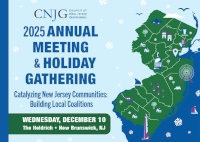 Catalyzing New Jersey Communities: Building Local Coalitions
Catalyzing New Jersey Communities: Building Local Coalitions
Wednesday, December 10, 2025 - 10:00 am to 3:00 pm
Location: The Heldrich Hotel & Conference Center
10 Livingston Avenue, New Brunswick, NJ 08901
Join over 125 of your fellow CJNG members and special guests for a day to celebrate the end of the calendar year, connect with colleagues, and explore this year's theme: Catalyzing New Jersey Communities: Building Local Coalitions. We will celebrate our collective impact, share stories of success, learn from one another’s experiences, and collectively envision a more connected, resilient, and equitable future for New Jersey. The Annual Meeting & Holiday Gathering includes a panel discussion that will explore the profound and tangible ways that philanthropy can move beyond traditional grantmaking to become powerful coalition builders for lasting change.
During the luncheon, we will convene our annual business meeting to elect new trustees, recognize new CNJG members, and report on our activities for the year. There will be time to connect and collaborate with colleagues and friends, old and new.
The day kicks off with a New Member Orientation for any new CNJG members or new staff of existing members to learn more about CNJG’s many offerings. Separate registration is required.
Prior to the Annual Meeting, CNJG will offer a deeper dive into the Impala platform that will launch in New Jersey for all grantmakers and all nonprofits. During this workshop, we will showcase the Impala for Grantmakers product which can help you:
- Conduct due diligence for potential and returning grantees
- Find nonprofits that you might not yet know
- Find who else is funding in a particular geographic or topical area
- Find which nonprofits are working in a particular geographic or topical area
- Find connections to other funders
- Communicate to potential applicants what your funding criteria is
| Agenda | |
| 9:00 am – 12:00 noon | Registration, Networking, Continental Breakfast and Coffee |
| 10:00 am – 11:30 am | Workshop |
| 12:00 noon – 12:45 pm | CNJG Annual Meeting of Members |
| 12:45 pm – 1:30 pm | Lunch and Networking |
| 1:30 pm - 2:20 pm | Panel followed by Q & A |
| 2:20 pm – 2:35 pm | Meeting adjourns |
| 2:35 pm – 3:00 pm | Networking |
Responding Post Sandy: Philanthropic Relief & Recovery
Superstorm Sandy officially came ashore in New Jersey on October 29, 2012 at 8:00 p.m. and its aftermath continues to be felt in communities throughout our state. Not 24 hours after the storm made landfall, CNJG began planning a series of actions to help inform funders what to be prepared for, share information and discuss strategies. CNJG's support of the philanthropic community as it navigates the shifting landscape of disaster recovery, continues.
CNJG has been working closely with their philanthropic members in New Jersey and their philanthropic colleagues from around the nation who have experience in disaster philanthropy, as well as working cooperatively with the Governor’s Office on Recovery, FEMA, NJ State Police Office of Emergency Management, NJ Voluntary Organizations Active in Disaster, NJ’s Long Term Recovery Group Leaders, and NJ’s leading nonprofit organizations.
Post Sandy Funder Briefings
Beginning one week after Sandy struck New Jersey CNJG launched a weekly conference call series for grantmakers to hear from policymakers, disaster relief/recovery experts and colleagues who have been through similar catastrophes. Grantmakers heard from nearly 70 guest speakers including policymakers, disaster relief and recovery experts, and statewide and national foundation leaders that have experienced similar catastrophes. The briefings provided an opportunity to connect directly with local leaders and state officials addressing the many needs of our communities. Grantmakers learned about issues related to both disasters in general and Sandy recovery in particular. Topics included housing, mental health, social justice, universal design, FEMA’s National Disaster Recovery Framework, and an array of environmental issues. All of the calls were recorded and also transcribed into concise written summaries and are available on our website.
Series 1 ran from November 2012 -- March 2013
Series 1 Audio Recordings
Series 1 Written Summaries
Series 2 ran from September 2013 -- November 2013
Series 2 Audio Recordings
Series 2 Written Summaries
Series 1 & 2 Written Compendium
Funders’ Briefing Post Sandy Recovery at 18 months
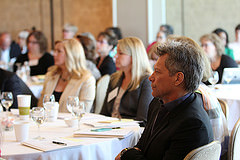 With support from the Jon Bon Jovi Soul Foundation and OceanFirst Foundation, CNJG presented a specific briefing on housing, hunger and mental health recovery efforts and needs 18 months after the storm. We heard personal stories from families that were displaced and their long struggle to rebuild and recoup. We heard insights from service providers on the long term effects of Sandy. Several Long Term Recovery Groups described some of their ongoing challenges, but also shared what was working.
With support from the Jon Bon Jovi Soul Foundation and OceanFirst Foundation, CNJG presented a specific briefing on housing, hunger and mental health recovery efforts and needs 18 months after the storm. We heard personal stories from families that were displaced and their long struggle to rebuild and recoup. We heard insights from service providers on the long term effects of Sandy. Several Long Term Recovery Groups described some of their ongoing challenges, but also shared what was working.
CNJG’s response to Superstorm Sandy also included
Coastal Communities Site Visit Tours
CNJG offered its members a rare opportunity to tour several of the disaster-affected communities in Monmouth and Ocean Counties and to hear from those on-the-ground. Throughout the day, twelve guest speakers representing all areas of the effort, including individuals from FEMA, local and state government, Long Term Recovery Group leaders, city and state planners, environmental professionals, social services personnel, and faith-based leaders, among others spoke to a group of 60 philanthropic leaders. Building upon the first successful Coastal Communities Site Visit Tour, CNJG offered a similar program focusing on communities in northern New Jersey – specifically the hard hit areas in Essex, Hudson and Bergen Counties. In addition to hearing from a wide range of local officials, Long Term Recovery Group Leaders, urban planners, and environmental experts, the site visit included a tour of a PSEG sub-power station which was flooded.
Statewide Conference
Bringing together an incredible community of funders, providers and practitioners for a day of exploration, shared learning and discussion at the Spring 2013 Conference for the Social Sector - Our Shared Road Ahead: Sandy and Beyond on June 10. The Conference provided participants with an important opportunity to hear about the lessons learned by social sector colleagues and experts around the country who have grappled with how to create effective long-term philanthropic responses to catastrophic events in the absence of a readily available guide.
Superstorm Sandy Philanthropic Investments Scan
Philanthropy & Hurricane Sandy: A Report on the Foundation & Corporate Response is a report released in October 2014 by CNJG and partners that examines the response of foundations, corporations, and other institutional donors to the devastation wrought by Hurricane Sandy in October 2012. Numbering nearly 600, these funders have so far committed more than $380 million for relief, recovery and building efforts. The hard data and reflective observations in the report contribute to the growing body of knowledge that helps foundations and corporations be strategic and effective with their giving when disaster strikes.
Two years after the historic storm, this report breaks down the allocation of dollars contributed thus far and offers perspective on the role of private giving in disaster response and lessons to be taken from this one. The report was published by the Foundation Center in partnership with the Council of New Jersey Grantmakers and Philanthropy New York, and with support from the Center for Disaster Philanthropy.
Special thanks to our philanthropic partners that have supported various aspects of the Council’s work beginning immediately after Hurricane Sandy struck through our ongoing work today, including: the Center for Disaster Philanthropy, Citi, Fund for New Jersey, The Henry & Marilyn Taub Foundation, The Horizon Foundation for New Jersey, Hurricane Sandy New Jersey Relief Fund, JCP&L, JPMorgan Chase, Jon Bon Jovi Soul Foundation, The Merck Company Foundation/Merck & Company, Inc., PSEG Foundation, Provident Bank Foundation, Rita Allen Foundation, Subaru, TD Bank, United Way of Essex and West Hudson, Verizon NJ, and the Victoria Foundation.
Hosted by United Philanthropy Forum, in partnership with the Council on Foundations and Independent Sector, Foundations on the Hill (FOTH) is an annual opportunity for foundation executives, staff, and board members, philanthropy-serving organizations, and other philanthropic and social sector leaders to meet with their federal lawmakers, talk about issues of interest to philanthropy, and strengthen relationships with their representatives.
The overall purpose of Foundations on the Hill is to:
- Inform and educate Congress about philanthropy
- Advocate on issues affecting foundations
- Build CNJG’s relationships with lawmakers and their staff
- Create visibility for foundations and philanthropy on Capitol Hill
- Encourage Congress to view foundations as resources on key public policy issues
CNJG Makes Strong Showing at Foundations on the Hill 2025
The Council of New Jersey Grantmakers joined over 350 colleagues nationwide at Foundations on the Hill (FOTH) from February 23rd to 26th. This premier policy conference brought together the philanthropic sector for advocacy and education.
The CNJG delegation, led by our President and CEO Theresa Jacks, included Board Chair Craig Drinkard, Executive Officer, Victoria Foundation, Policy Co-chairs, Lucy Vandenberg, Executive Director, The Schumann Fund for New Jersey and William Engel, President, The Union Foundation, as well as a diverse group of foundation leaders representing various regions and interests across New Jersey. Notably, Linda Czipo, President and CEO of the New Jersey Center for Nonprofits, also participated, providing valuable insights from the nonprofit perspective.
FOTH offered a rich program beyond meetings with legislators. Attendees participated in conference sessions, learned about key national trends in philanthropy, and engaged with experts on critical issues like equitable grantmaking, tax reform, and the budget reconciliation process.
The CNJG delegation met with all New Jersey Congressional and Senate offices, including meeting directly with Congressmen Josh Gottheimer and Herb Conaway, and Senator Andy Kim, along with a photo meet-up with Senator Cory Booker. They advocated for the bipartisan Charitable Act, H.R.801/S.317). These bills modify and extend the deduction for charitable contributions for individuals who do not itemize deductions on their tax returns, thereby incentivizing charitable giving and encouraging greater philanthropic support for nonprofits and the communities they serve.
Beyond policy discussions and sharing what is happening on the ground in our state’s communities as a result of executive actions, FOTH provided valuable networking opportunities. The annual CNJG dinner fostered connections and relationships within the delegation, as well as time to debrief about what we were hearing on the Hill. Special thanks to Jermey Grunin, President, Grunin Foundation and Bill Engel for underwriting our dinner!
Overall, CNJG's participation in FOTH proved successful. By advocating for key legislation, educating Congress, and building relationships, CNJG helps ensure the voice of New Jersey philanthropy is heard on Capitol Hill.
2025 CNJG Delegation:
Carrie Bersak, Program Officer, The Burke Foundation
Sharif Braxton, Director, EQUIP NJ
Naeema Campbell, Program Officer, The Fund for New Jersey
Linda Czipo, President and CEO, New Jersey Center for Nonprofits
Kortney Swanson Davis, President and CEO, Forman S. Acton Educational Foundation
Craig Drinkard, Executive Officer, Victoria Foundation
William Engel, President, The Union Foundation
Alma Garcia, Director, Equity Ahora
Jeremy Grunin, President, Grunin Foundation
Theresa Jacks, President and CEO, CNJG
Jessica Johansen, Manager of Portfolio and Strategic Operations, The Tepper Foundation
Sharnita Johnson, Vice President, Victoria Foundation
Jessica Nugent, Senior Program Officer, The Burke Foundation
Katherine Nunnally, CEO, Smith Family Foundation
Jonathan Pearson, Executive Director, The Horizon Foundation for New Jersey
Shelley Skinner, Managing Director of Portfolios, The Tepper Foundation
Nelida Valentin, Vice President, Grants & Programs, Princeton Area Community Foundation
Lucy Vandenberg, Executive Director, The Schumann Fund for New Jersey
Renee Woodside, Associate Director, The Horizon Foundation for New Jersey
Hellen Zamora-Bustos, Grassroots Community Advocate, Equity Ahora
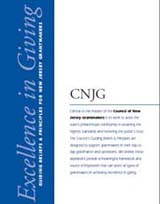
This includes insights and tips related to board governance, legal compliance, grantee communications, fiscal responsibility, public disclosure, and many other key areas of foundation governance and operations. It is intended to serve as a practical resource to assist foundations in their grantmaking.
The Council of New Jersey Grantmakers’ 2023 – 2027 Strategic Plan reimagines the future for CNJG. As a result of the extensive strategy development process, the plan includes a renewed vision, mission, core values, and goals. The work is informed by previous efforts, and current issues and trends impacting philanthropy and society.
The 2023 - 2027 Strategic Plan is a roadmap for the next five years, built upon CNJG's past strategic plans and learnings. We look forward to executing this plan, the additional learnings and opportunities it will bring, and delivering on these goals to move us into the future.
You will have an opportunity to learn about the collaborative process that resulted in this first version of the framework. In addition, you will hear from peers and practitioners who contributed to the development of the framework. Don't miss this opportunity to gain a deeper understanding of the framework's design principles and how they foster equity, transparency, and responsible AI adoption.
Speakers
Jean Westrick, Executive Director, TAG
Gozi Egbuonu, Director of Programs, TAG
Who Should Attend
Grantmaking Executives
Philanthropy Tech Professionals
Program Managers
Technology Leaders
AI for Good Enthusiasts and Advocates
COST: Free for CNJG Members and Non Member Grantmakers
Jean Westrick, Executive Director
Technology Association of Grantmakers
Jean Westrick is the Executive Director of the Technology Association of Grantmakers, a nonprofit organization that cultivates the strategic, equitable, and innovative use of technology in philanthropy. Westrick brings two decades of experience building communities, leveraging technology, and leading innovative and programmatic strategies. Prior to being named Executive Director of TAG, Westrick was the Director of IT Strategy and Communications at The Chicago Community Trust where she led change management efforts for the foundation’s $6M digital transformation initiative. Also, while at The Trust, Westrick directed On the Table, an award-winning engagement model designed to inspire resident action that was replicated in 30 cities nationwide. A longtime advocate for equity in STEM education, expanding technology access and increasing science literacy, Westrick holds a Bachelor of Arts from Michigan State University and a Master of Science from DePaul University.
Gozi Egbuonu, Director of Programs
Technology Association of Grantmakers
Gozi Egbuonu is the Director of Programs at the Technology Association of Grantmakers (TAG), a nonprofit organization with a mission to cultivate the strategic, equitable, and innovative use of technology in philanthropy. Prior to TAG, Gozi was an Impact Officer at Network for Good’s (now Bonterra) capacity-building program called Jumpstart. Through her advocacy for philanthropic investments in the technological capacity of talented nonprofit leaders and organizations throughout the United States, Gozi helped generate more than $500,000 in capacity-building funds to help nonprofits become more sustainable. In addition to helping generate lasting impact for nonprofits, Gozi created meaningful content and events aimed at educating philanthropic communities on the power of trust-based partnerships between grantmakers and nonprofits. Committed to using technology to improve lives and advance social change, Gozi is researching the use of medical technology to improve healthcare delivery while earning her doctorate in behavioral health from Cummings Graduate Institute. She also holds a Bachelor of Fine Arts from Washington and Lee University, a Master of Arts from Pepperdine Graduate School of Education and Psychology, and a Master of Science from the University of Rochester School of Medicine and Dentistry.
A key objective of the Scaling What Works initiative has been to translate insight and learning from grantmaker intermediaries involved with the Social Innovation Fund and share them with the broader philanthropic community. The fifth guide in the Lessons Learned series presents the benefits and challenges of partnerships between local and national funders, and highlights key considerations for both kinds of funders to foster success in their collaboration.
This paper explores community democracy as a cultural choice and a potential organizing system for philanthropy using stories that demonstrate its principles and practices, primarily growing from the experience of northern California communities. This experience offers a framework of principles and a beginning set of conclusions about how philanthropy can develop productive partnerships from the perspective of a place-based, community democracy.
by Tai Cooper and Jeremy Johnson
“When I Become Mayor, We All Become Mayor”
When Ras J. Baraka won the mayoral election for New Jersey’s largest city last year, expectations were high. The former South Ward councilman, one-time principal of Central High School and son of the famed poet-activist Amiri Baraka championed a populist vision. During the campaign, he famously told residents, “When I become Mayor, we all become Mayor!”
In the days leading up to, and following the election, the Council of New Jersey Grantmakers recognized an opportunity to work intensively with the incoming mayor. CNJG had previously established a nonpartisan, City Hall-based Newark Philanthropic Liaison office, in collaboration with then Mayor Cory Booker in 2007.
Following the transition, Mayor Baraka and CNJG built exciting new bridges.
For example, the Mayor included the grantmakers’ recommendations for collaboration as an appendix to his strategic plan, The Blueprint for a New Newark.
“We felt this transition was a time for funders to ‘lean in,’” said Nina Stack, President of the Council of New Jersey Grantmakers. “The grantmaking community spent seven years organizing ourselves to work collectively with the City of Newark. Under Mayor Baraka, we saw an opportunity to build on old investments and create new ones.”
Prioritizing Five Pillars
It’s impossible for philanthropy to be a panacea for all of Newark’s challenges. But the Mayor’s team appreciated the value that philanthropic partners brought to the table. Fueled with support from CNJG members, including the Geraldine R. Dodge Foundation, the Newark Philanthropic Liaison office, in concert with the Mayor’s Chief Policy Advisor, set about to convene, connect, and leverage partnerships and resources for Mayor-identified pillars.
Among dozens of issues, the Mayor has cited five initiatives as worthy of philanthropic engagement and top of mind attention. So far in 2015, $3 million in private support is helping seed strategies that show promise for Newark residents.
1. Public Safety
Mayor Baraka has long understood violence to be a public health issue. He has won praise for a constant rhythm of neighborhood events, summits, and youth presentations to address violence. Local funders have rallied around several prongs of the Mayor’s initiatives. For example, CNJG members funded a cross-sector retreat to coalesce multiple public safety partners working in the city. That retreat has led to the creation of the Safer Newark Council, committed to inter-connected solutions to reduce violent crime and improve perceptions of safety.
An accompanying funder-supported initiative is the Newark Community Street Team. The team comprises 15 outreach workers in the South Ward Model Neighborhood Initiative. They are assisting approximately 100 individuals to stabilize their lives and turn away from a life of crime, through mentoring, life skills, and case management.
2. Education – Communities Schools/Read and Believe
As a former principal, Mayor Baraka has been outspoken on the critical role of education in Newarkers’ lives. His appointment of Dr. Lauren Wells as Chief Education Officer in the Office of Comprehensive Community Education has helped inaugurate long-term and short-term public-private efforts.
Dr. Wells has written how “community schools” help mitigate the impacts of poverty on students and provide an environment that can greatly improve schools. Launching community schools will necessitate early support from the funding community. Encouraging discussions are underway among neighborhood residents, funders, and education leaders.
Read and Believe, a literacy-focused initiative, imagines a city that takes on literacy as a communal cause. The umbrella campaign includes, among several programs,My Very Own Library. CNJG members, including the Foundation for Newark’s Future, as well as Rutgers, individual donors and Scholastic’s Summer Reading Challenge, enabled MVOL to serve 27,000 Newark Public School students in grades K-8 students. Each child selected four free books to take home for summer break.
3. Centers of Hope
The Centers of Hope are nine community-based centers in all five of Newark’s wards that allow access to City services, wellness and enrichment opportunities where people live and work. Four centers have opened thus far, some focusing on young women, special needs, entrepreneurship, and municipal ID access. All offer a variety of after school, athletic, arts and culture, educational, environmental, healthy living, free WiFi and recreation programming to engage children and families.
4. My Brother’s Keeper Newark
The Mayor’s My Brother’s Keeper Newark initiative is part of a nationwide, White House-led campaign to empower boys and men of color and strengthen the systems that ensure their success. MBKN’s goals are dependent on cross-sector partnerships, data-mining, and a combination of policy and direct-service projects. CNJG members have provided seed funding for the MBKN’s initial roundtables, forums, and on-ramping initiatives. Most notable was a “Young Men of Color and Law Enforcement” forum at Central High School, designed to address issues that damage the relationship between African-American and Latino youth and law enforcement. The White House has recognized MBKN as a leader among the national communities that are building greater supports for young men of color.
5. Summer Youth Employment Program and Postsecondary Access
One of the biggest success stories of the year was the dramatic increase in the number of teenagers employed in the Mayor’s Summer Youth Employment Program. Newark went from 1,500 last summer to over 2,600 youth who got jobs. The growth was prompted by a partnership between the Mayor’s office, funders, New Jersey Institute of Technology, and the Newark City of Learning Collaborative (NCLC). One thousand of the teens were enrolled in jobs that provided not only a paycheck but also learning opportunities for coding, urban landscaping, and an NCLC Summer Learning Institute on the campus of Essex County College. Financial empowerment and banking support for these first time workers, made possible from the Cities for Financial Empowerment Fund, was an added bonus.
The New York Times recently praised Mayor Baraka for defying expectations. Working collaboratively with residents, institutions, and funders, the Mayor is driving the change that makes Newark a city we all can believe in.
Tai Cooper is Chief Policy Advisor to Mayor Ras J. Baraka. Jeremy Johnson is the Newark Philanthropic Liaison, a position funded by the Council of New Jersey Grantmakers as a joint venture with the Mayor.

